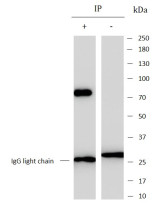ARG44738
anti-CD328 / Siglec 7 antibody
anti-CD328 / Siglec 7 antibody for Immunoprecipitation,Western blot and Human
Overview
| Product Description | Mouse Monoclonal antibody recognizes CD328 / Siglec 7 |
|---|---|
| Tested Reactivity | Hu |
| Tested Application | IP, WB |
| Host | Mouse |
| Clonality | Monoclonal |
| Isotype | IgG1 |
| Target Name | CD328 / Siglec 7 |
| Antigen Species | Human |
| Conjugation | Un-conjugated |
| Alternate Names | QA79 membrane protein; p75; CD antigen CD328; SIGLEC19P; Adhesion inhibitory receptor molecule 1; SIGLECP2; Sialic acid-binding Ig-like lectin 7; SIGLEC-7; p75/AIRM1; CDw328; Siglec-7; AIRM-1; CD328; AIRM1; D-siglec; QA79 |
Application Instructions
| Application Suggestion |
|
||||||
|---|---|---|---|---|---|---|---|
| Application Note | * The dilutions indicate recommended starting dilutions and the optimal dilutions or concentrations should be determined by the scientist. |
Properties
| Form | Liquid |
|---|---|
| Purification | Protein A purification |
| Buffer | PBS with 0.09% sodium azide |
| Storage Instruction | For continuous use, store undiluted antibody at 2-8°C for up to a week. For long-term storage, aliquot and store at -20°C or below. Storage in frost free freezers is not recommended. Avoid repeated freeze/thaw cycles. Suggest spin the vial prior to opening. The antibody solution should be gently mixed before use. |
| Note | For laboratory research only, not for drug, diagnostic or other use. |
Bioinformation
| Database Links |
Swiss-port # Q9Y286 Human Sialic acid-binding Ig-like lectin 7 |
|---|---|
| Gene Symbol | SIGLEC7 |
| Gene Full Name | sialic acid binding Ig-like lectin 7 |
| Function | Putative adhesion molecule that mediates sialic-acid dependent binding to cells. Preferentially binds to alpha-2,3- and alpha-2,6-linked sialic acid. Also binds disialogangliosides (disialogalactosyl globoside, disialyl lactotetraosylceramide and disialyl GalNAc lactotetraoslylceramide). The sialic acid recognition site may be masked by cis interactions with sialic acids on the same cell surface. In the immune response, may act as an inhibitory receptor upon ligand induced tyrosine phosphorylation by recruiting cytoplasmic phosphatase(s) via their SH2 domain(s) that block signal transduction through dephosphorylation of signaling molecules. Mediates inhibition of natural killer cells cytotoxicity. May play a role in hemopoiesis. Inhibits differentiation of CD34+ cell precursors towards myelomonocytic cell lineage and proliferation of leukemic myeloid cells (in vitro). [UniProt] |
| Cellular Localization | Membrane; Single-pass type I membrane protein. [UniProt] |
| Calculated MW | 51 kDa |
| PTM | Tyrosine phosphorylated. [UniProt] |
Images (2) Click the Picture to Zoom In







